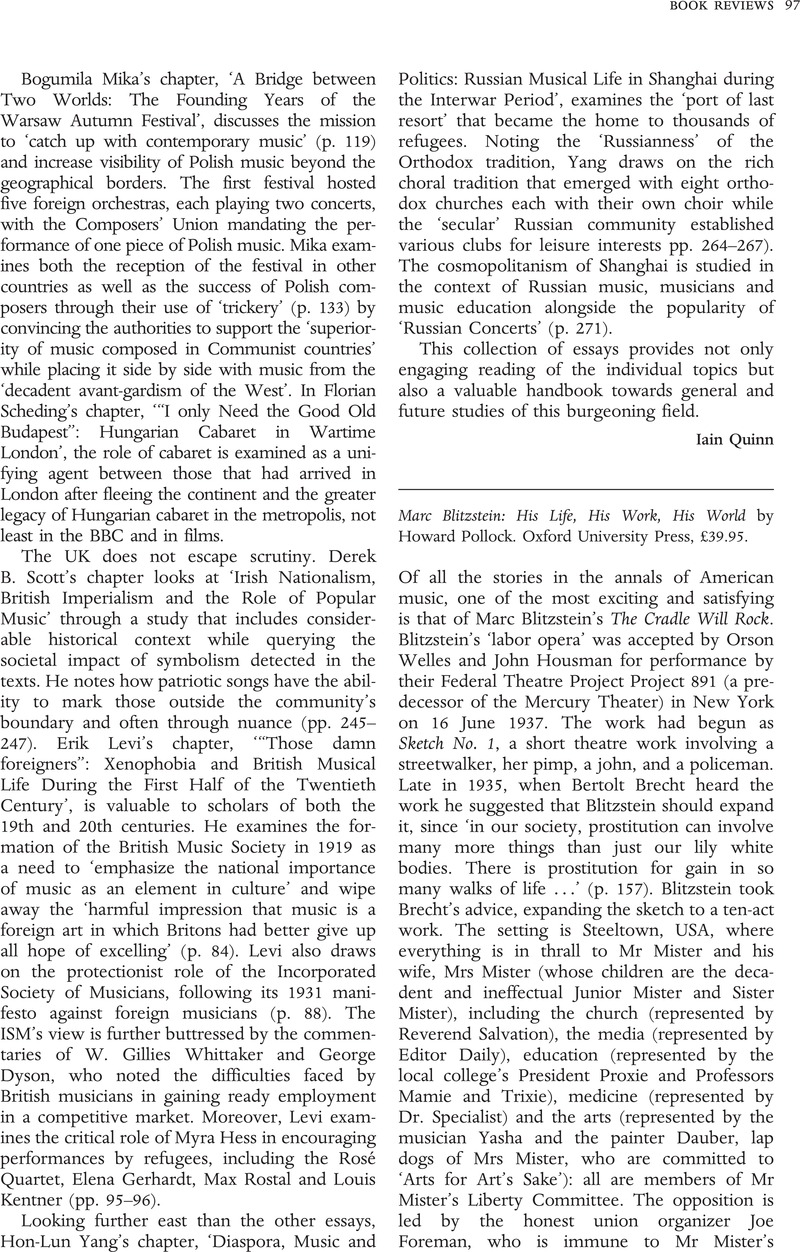Article contents
Marc Blitzstein: His Life, His Work, His World by Howard Pollock. Oxford University Press, £39.95.
Published online by Cambridge University Press: 08 October 2013
Abstract

- Type
- Book Reviews
- Information
- Copyright
- Copyright © Cambridge University Press 2013
References
1 Blitzstein wrote to his sister, ‘Hallie F. is nuts about the piece – but just as terrified of it’. Pollock, p. 172.
2 ‘Flagan had reason for concern, as the Federal Theatre Project had been singled out by conservative members of Congress as epitomizing the alleged waste and liberal bias of the entire WPA. Reactionary forces eventually engineered the demise of the Federal Theatre in 1939, but not before, in an appearance before the House Un-American Activities Committee, Hallie Flanagan attempted to clarify, among other things, the matter of Renaissance playwright Christopher Marlowe's alleged communist associations. In such an environment, an FTP production of The Cradle Will Rock easily could play into the hands of the Federal Theatre's enemies, so that Flanagan and her associates faced ethical dilemmas not unlike those posed by the opera itself.’ Pollock, p. 172.
3 Housman and Welles. Pollock, p. 174.
4 Howard de Silva, who played Larry Foreman, had his toupee confiscated by the guards. Lehman Engel, the conductor, managed to smuggle the conductor's score of the work out of the theatre by hiding it under an overcoat.
5 Pollock, p. 178. At the end of his life, Welles was attempting to find funding for a movie to be called The Cradle Will Rock, which was to tell this story. The Hollywood movie, Cradle Will Rock, from 1999, written and directed by Tim Robbins, tells a semi-fictionalized version of it, along with that of the controversial mural that Nelson Rockefeller commissioned from Diego Rivera for Rockefeller Center (controversial due to its inclusion of an image of Lenin), intertwining them with other factual and fictional strands to present a picture of arts and politics in the US during the great depression.
6 Pierre Degeyter was the composer of the Internationale. The Composers Collective was founded by Charles Seeger and Henry Cowell; its members included Earl Robinson, Eli Seigmeister, Lan Adomian, Ruth Crawford, and Norman Cazden. Copland was an occasional visitor. The group's mentor and guiding spirit was Hanns Eisler.
7 Blitzstein, in an article in the New York Times, 5 January 1941; quoted in Pollock, p. 223.
8 Letter from Marc Blitzstein to Mina Curtiss. See Eric A. Gordon, Mark the Music (New York: St Martin's Press), p. 399.
9 Levant, A Smattering of Ignorance, quoted in Pollock, p. 132.
10 Among the operas commissioned by the Ford Foundation in this project were Samuel Barber's Antony and Cleopatra, Douglas Moore's The Wings of the Dove, Robert Ward's The Crucible, Ned Rorem's Miss Julie, Jack Beeson's Lizzie Borden, Hugo Weigall's Nine Rivers from Jordan, Marvin David Levy's Mourning Becomes Electra, and Virgil Thomson's Lord Byron.
11 The National Review, 8/11 (12 March 1960), pp. 157–158Google Scholar, quoted in Pollock, p. 448.
- 1
- Cited by




